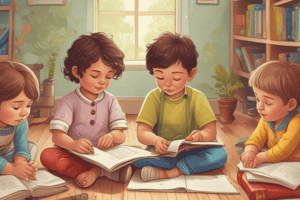Podcast
Questions and Answers
What is the Montessori method?
What is the Montessori method?
What is the age range for Montessori Children's Houses?
What is the age range for Montessori Children's Houses?
What is the focus of the first plane of development in the Montessori method?
What is the focus of the first plane of development in the Montessori method?
What did Montessori believe was the role of education in achieving world peace?
What did Montessori believe was the role of education in achieving world peace?
Signup and view all the answers
What is the age range for the third plane of development in the Montessori method?
What is the age range for the third plane of development in the Montessori method?
Signup and view all the answers
What is the trademark status of the Montessori name?
What is the trademark status of the Montessori name?
Signup and view all the answers
What is the focus of the second plane of development in the Montessori method?
What is the focus of the second plane of development in the Montessori method?
Signup and view all the answers
What is the age range for Montessori elementary school classrooms?
What is the age range for Montessori elementary school classrooms?
Signup and view all the answers
What did a 2006 study find about the effectiveness of the Montessori method?
What did a 2006 study find about the effectiveness of the Montessori method?
Signup and view all the answers
Study Notes
Montessori education is a teaching method that emphasizes hands-on learning and developing real-world skills. It discourages some conventional measures of achievement, such as grades and tests. Maria Montessori, an Italian physician, developed the method in the early 20th century through scientific experimentation with her students. A range of practices exists under the name "Montessori," which is not trademarked. The method has mixed-age classrooms, student freedom, long blocks of uninterrupted work time, specially trained teachers, and prepared environments. Scientific studies regarding the Montessori method are mostly positive, with a 2017 review stating that "broad evidence" exists for its efficacy. Montessori education is based on a model of human development, believing that psychological self-construction in children and developing adults occurs through environmental interactions. Montessori classrooms for children under three fall into several categories, with a number of terms being used. Montessori classrooms for children from 2+1⁄2 or 3 to 6 years old are often called Children's Houses. Elementary school classrooms usually serve mixed-age 6- to 9-year-old and 9- to 12-year-old groupings. Montessori education for middle and high school levels is less developed than programs for younger children. Montessori observed four distinct periods or "planes" in human development, extending from birth to 6 years, from 6 to 12, from 12 to 18, and from 18 to 24. Finally, Montessori observed in children from three to six years old a psychological state she termed "normalization."Overview of Montessori Education
- Montessori education was developed by Dr. Maria Montessori in the early 1900s and is focused on the individual’s development and learning process.
- Montessori education is divided into four planes of development: birth to 6 years, 6 to 12 years, 12 to 18 years, and 18 to 24 years.
- The first plane of development is focused on the development of the senses, language, and movement.
- The second plane of development is focused on the development of the imagination and intellectual curiosity.
- The third plane of development is focused on the development of social skills and emotional stability.
- Montessori believed that education had an important role in achieving world peace, stating that “preventing conflicts is the work of politics; establishing peace is the work of education.”
- Studies show that certain elements of the Montessori method are effective, including teaching early literacy through a phonics approach and providing a sensorial foundation for mathematics education.
- A 1975 study showed that children under a Montessori program had higher mean scores on the Stanford–Binet Intelligence Scales than those in traditional programs.
- A 2006 study found that “when strictly implemented, Montessori education fosters social and academic skills that are equal or superior to those fostered by a pool of other types of schools.”
- The US Patent and Trademark Office ruled that “the term ‘Montessori’ has a generic and/or descriptive significance” in 1967, leading to public misconceptions of the method.
- The Philippines’ Department of Education allows schools to use the term “Montessori” only if they satisfy certain guidelines by the Federation of Philippine Montessori Schools.
Studying That Suits You
Use AI to generate personalized quizzes and flashcards to suit your learning preferences.
Description
Are you interested in innovative and child-centered teaching methods? Take our Montessori Education quiz to test your knowledge on the unique approach developed by Dr. Maria Montessori. From the four planes of development to the benefits of mixed-age classrooms, this quiz will challenge your understanding of this widely recognized educational philosophy. Whether you are a parent, educator, or simply curious about alternative teaching methods, this quiz is perfect for anyone interested in learning more about Montessori education.




